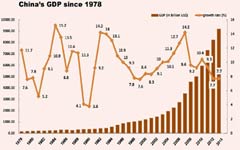"The glass-half-full view is that the imbalance has stopped getting worse. The half-empty view is that the difficult transition of weaning the economy off investment has not yet begun."
He does, however, believe there are some positive trends that suggest rebalancing is actually taking place.
 |
He, too, believes it is difficult to make firm judgments based on the last two quarters' data.
"If we look over the past four quarters, consumption and investment have contributed roughly the same to growth and this suggests both have now stabilized relative to GDP."
Jonathan Garner, chief Asia strategist of Morgan Stanley, based in Hong Kong, is confident China is achieving rebalancing and is now at the point Japan reached in the 1970s and South Korea in the 1980s.
"If you look at the economic history of both South Korea and Japan, China is about to reach the GDP per capita that they both reached when a consumer society took hold.
"At that point, most of the physical infrastructure has been done and the savings ratio begins to fall."
Garner, who presented his own research on China's rebalancing and reform agenda in Beijing last month, says much of the evidence of rebalancing is seen in consumption data. The number of passenger cars registered in the first five months of 2014, according to Morgan Stanley research, increased 15.5 percent over the same period last year, faster than items associated with investment spending, like cement consumption increasing 5 percent and that of steel just 3 percent.
